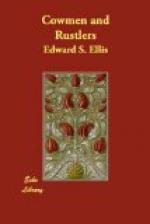But before taking so rash a step, the cooler judgment of the leader came to his rescue—He placed a high value on Duke Vesey, who had been associated with him in several dangerous enterprises, and he knew that any harm done to Sterry would recoil on him, just as the grim Capt. Asbury had threatened.
After prolonged discussion with Cadmus and others, it was decided to offer to exchange Sterry for Vesey. The proposition was accepted, and the exchange faithfully made, though considerable more delay was involved.
But while it was under way Inman learned of Jennie Whitney’s flight toward the Big Horn Mountains. Keener of wit than Larch Cadmus, he suspected the truth at once, though he knew nothing of the proximity of the stockmen.
Before making the attack and attempt to burn the building he sent out two of his best mounted men in the direction taken by her, to investigate. They did so with such skill that neither Budd Hankinson nor any of the stockmen suspected them. They returned with news of the approach of a body too powerful for them to think of combating. They therefore fled in the darkness, the promptness of the leaders probably hastened by the knowledge that they were the parties for whom the stockmen were looking.
And so ended the campaign. The situation had been critical for a long time, and there were moments, time and again, when the most trifling incident intervened to avert a fearful conflict between men of the same race and blood; but all had now passed, and it may be said that not so much as a hostile shot had been exchanged.
The main events of the troubles in Wyoming between the cowmen and rustlers are too well remembered to require recital at our hands. The expedition referred to in another place left Cheyenne in April for Nolan’s Ranch, a hundred or more miles distant. Within the following month, the Sixth U.S. Cavalry brought all of them back to Cheyenne as prisoners of war, thus saving them from extermination at the hands of the indignant rustlers, who had them hemmed in on all sides.
Fred Whitney sold out his ranch, near the headwaters of Powder River, and moved eastward. He was not actuated by fear, for it will be conceded that he proved his courage, but he desired to take his loved mother and sister away from the sorrowful memories that must always cling to the place.
It will not surprise the reader to learn, further, that Monteith Sterry found it quite convenient to make his home in the same neighborhood with the Whitneys, and it was but a short time after this removal eastward that a most pleasing incident occurred in the lives of the young man and Miss Whitney, of the nature of which we are sure the reader does not need to be told.



